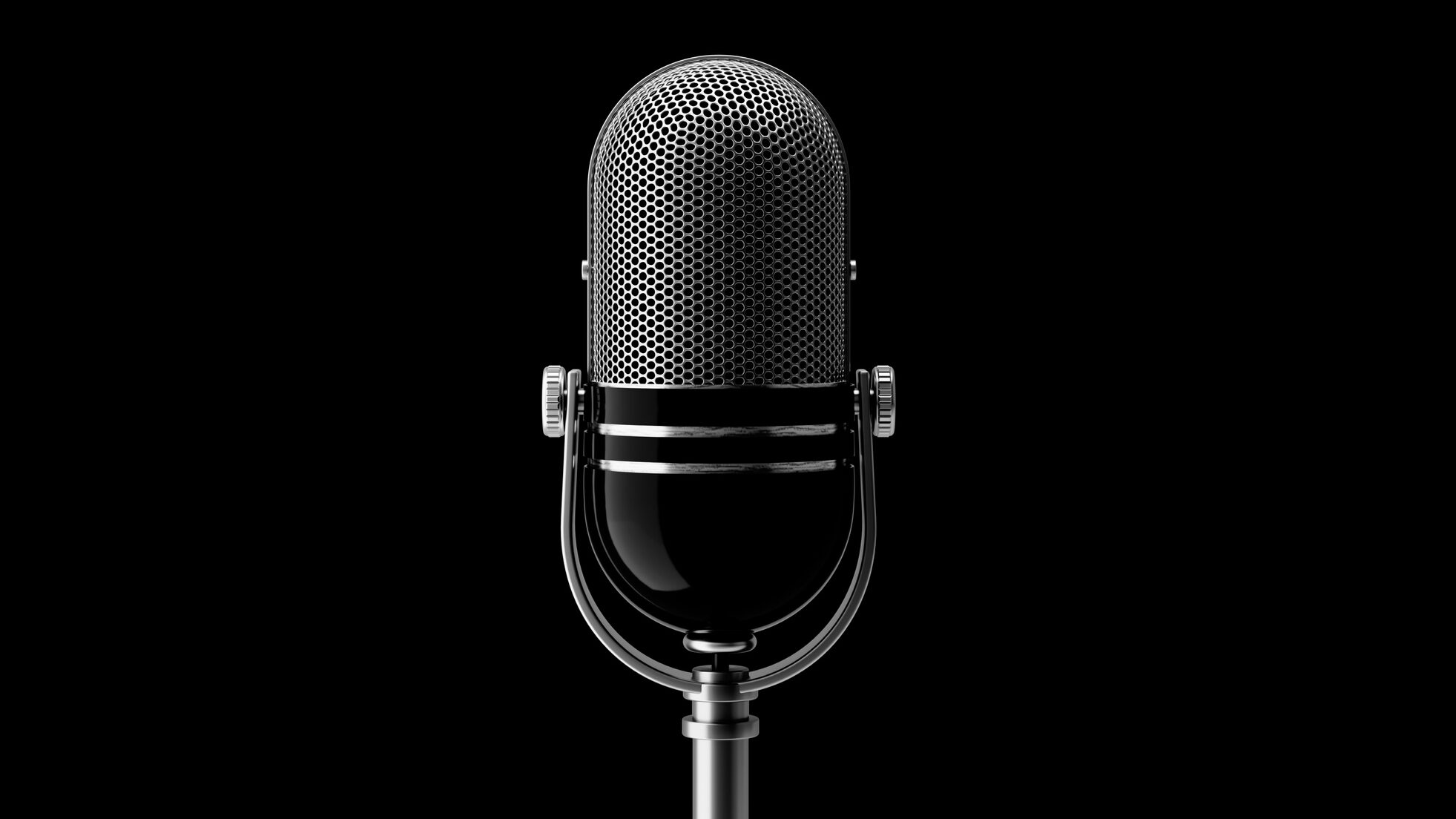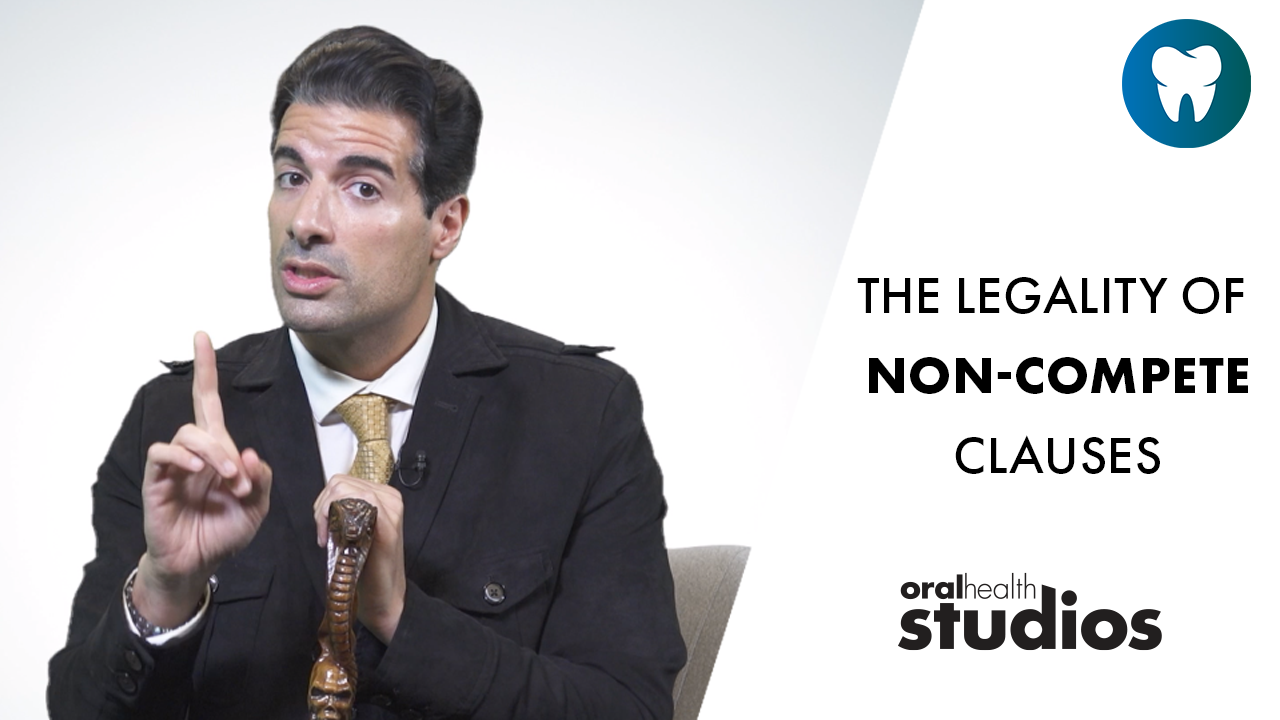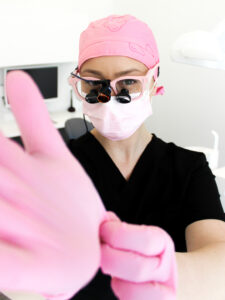
by Designs for Vision and Toothlife Scrub cap
Hey peeps, let me start by saying this: your eyeballs are just as precious as your patients. What exactly do I mean by this? Well, it’s quite simple. Eyesight is our most important sense. The eyes capture and interpret more than one million pulse signals per millisecond and transmit them to the brain. With such a high functioning role, it’s important to do everything we can to protect them. And this includes keeping them safe from harmful bacteria.
We’re all well-versed in the many precautionary measures to ensure that proper cleaning and infection prevention and control protocols are met each day in the office. Now more than ever, patient health and safety are essential to quality oral health care. As dental professionals, we are expected to execute a high standard of care without compromising our patients’ experiences while in the chair.
Think about how often you disinfect and decontaminate equipment, instruments, and surfaces throughout the workday, and how often you’re disposing of single-use products like face masks, gloves, and gowns. If we’re spending this much time ensuring proper sanitization protocols, why do we often neglect our loupes?
With an abundance of benefits, loupes need to be cared for properly. I’ve personally owned four pairs throughout my career so far and if you’re currently not practicing using loupes, I’ll discuss a few advantages to persuade you.
First off, loupes help enhance our visual acuity, improve precision, and lead to more direct and accurate diagnostic abilities. They help reduce strain on our eyeballs, improve work speed during appointments, and encourage better focus and hand-eye coordination. Loupes also promote proper chairside posture, which can prevent dreaded musculoskeletal problems in the future. In my opinion, they are essential for successful treatments.
Let’s get back to my point of our eyeballs being precious. With all of the incredible benefits that loupes have to offer, it’s safe to assume that many of us aren’t practicing a proper cleaning routine. To be honest, I was guilty of taking off my gown and hanging my loupes around my neck while walking around the office. I’ve certainly learned over the years that they deserve more love than that!
In my 15 years of dental hygiene practice, I can recall only a handful of appointments that have been practiced without my loupes. That being said, I’ve definitely learned the dos and don’ts when it comes to caring for my second set of eyes. If used properly, the recommended disinfection protocols for cleaning loupes work effectively. Unfortunately, likely, dental professionals aren’t consistently following recommendations provided by manufacturers. Not surprisingly, this poses a threat to the integrity of the loupes and the possibility of cross-contamination and asepsis.
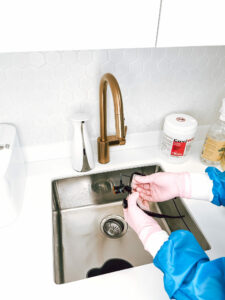
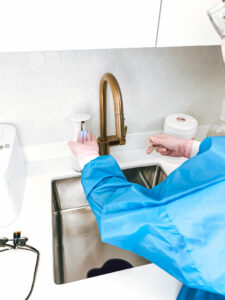

With the outbreak of coronavirus and the current state of the global pandemic, infection control procedures are of utmost importance and remain a top priority in the dental practice. This includes proper cleaning and disinfection of loupes so that we protect ourselves and our patients from harmful bacteria and potential viruses. Living in a constant state of worry over the last year, our patients are more aware than ever of their surroundings in the dental office. The Centers for Disease Control and Prevention (CDC) states that all dental healthcare professionals should wear protective eyewear. Taking this step helps shield the mucous membranes of our eyeballs from contact with microorganisms. Have you noticed yet that I enjoy the word eyeballs?
It’s safe to assume that we’re regularly disinfecting and sanitizing our face shields, but what about including loupe cleaning paired with face shield cleaning or disposal? Your loupes, similar to your face shield, gather dust and debris throughout the day. Not only that, they are in contact with pathogens from aerosolization and splatter during treatment. As I’m sure you’re all aware, there’s a strong possibility of cross-contamination if the contaminants aren’t effectively being cleaned at the end of each appointment.
A common misunderstanding among dental professionals seems to be surrounding the proper cleaning protocols, as loupes should be handled with care to produce first-class magnification. Next, I’ll break down the dos and don’ts for proper loupe cleaning.

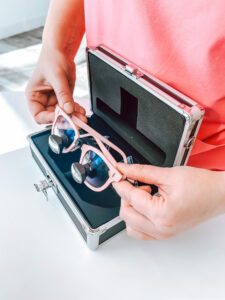
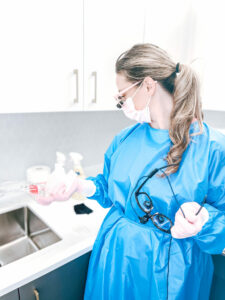
DO!
It’s important to thoroughly wash and sanitize your hands before cleaning your loupes. The entire point of disinfecting loupes is to eliminate any bacteria, germs, or viruses. If your hands aren’t properly cleaned, there’s a possibility of transfer. The best practice is to always wear regulated PPE and gloves, just as you would if you were disinfecting other equipment in the office.
Ensure that you clean the lenses with alcohol, bleach, phenol, or solvent-free glass cleaner and a soft, lint-free cloth. What’s the point of wearing loupes if the lenses are scratched? This will compromise the quality and effectiveness that they were specifically designed for. It’s also essential to pick the proper cleaning solution. With technological advancements in the industry, loupes are now designed with different materials, meaning that a standard cleaning agent developed for glass is no longer acceptable. Remember, avoid all cleaners that include alcohol, bleach, phenol, or solvents. If alcohol is included in the ingredient list, ensure it’s below 20 percent as stronger formulas can compromise the glue holding the ocular in the carrier lens.
Always store loupes in their accompanying case when not in use. Don’t let them dangle from around your neck! If stored safely in a case, it will protect the lenses from potential scratches, twisted cords, or the arms unexpectedly breaking. I’ve made the major mistake of leaving them on my desk between patients and had to unfortunately witness them plunge to the ground in slow motion. What’s worse, they fell LED light first when the cord got stuck to my pants. I learned my lesson.
DO NOT!
Do not apply a cleaning solution directly onto lenses. Lenses are designed with specific materials to be scratch-proof and anti-reflective. Damage to the lenses can occur if the wrong cleaning formula is applied. Be sure to always spray the cleaner onto a microfibre cloth before gently wiping the sections.
Avoid using cloths made from wool or cotton. Again, this will cause scratches. Small particles can transfer from the cotton or wool cloth and compromise the quality of your equipment. Microfibre cloths are the best option when it comes to cleaning loupes. Scratches on the lenses could not only affect your eyeballs, but may also compromise the quality of view during treatment.
Never, and I mean never, submerge your loupes in water (or any other form of liquid). It’s important to remember that while some loupes may be water-resistant, not all are waterproof.
Disinfection protocols recommend that cables and all exposed plastic sections are to be wiped with a surface or plastic-safe cleaner. Be very careful to not get any liquids in the ports of electrical connectors for LED products. And even though this should be common knowledge, never place loupes in an autoclave or ultrasonic bath.
While practicing multiple other infection control protocols in the office, be sure not to overlook your loupes. Implement the necessary steps and time to ensure everyone’s safety in the office. If you’re unsure of the proper steps to take, ask your manufacturers and sales reps for suggestions. Ergonomic and high-quality loupes play a crucial role in successful treatments, and successful treatments can only be executed properly when all sterilization and safety protocols are met.
Always protect your precious eyeballs and until next time, peace out peeps!
About the Author
 Irene Iancu has worked in various specialties including Paedo, Perio, General Practice and Orthodontics. Her goal in her current holistic practice is preventing and maintaining an optimal mind, mouth and body. Irene connects the systemic effects of oral conditions to her clients, while making a change for overall health and wellness. As a Peer and Quality Assurance Mentor contacted by the CDHO, a Clinical and Theoretical Dental Hygiene instructor at Oxford College, and a practicing dental hygienist in Toronto, Irene shares her passion for education with us today in the hopes we can change the lives of our clients and their loved ones. Irene can be contacted at Irene@toothlifestudios.ca, www.toothlifestudio.ca, IG: @ToothLife.Irene, @Toothlife, @Toothordare.podcast.
Irene Iancu has worked in various specialties including Paedo, Perio, General Practice and Orthodontics. Her goal in her current holistic practice is preventing and maintaining an optimal mind, mouth and body. Irene connects the systemic effects of oral conditions to her clients, while making a change for overall health and wellness. As a Peer and Quality Assurance Mentor contacted by the CDHO, a Clinical and Theoretical Dental Hygiene instructor at Oxford College, and a practicing dental hygienist in Toronto, Irene shares her passion for education with us today in the hopes we can change the lives of our clients and their loved ones. Irene can be contacted at Irene@toothlifestudios.ca, www.toothlifestudio.ca, IG: @ToothLife.Irene, @Toothlife, @Toothordare.podcast.


